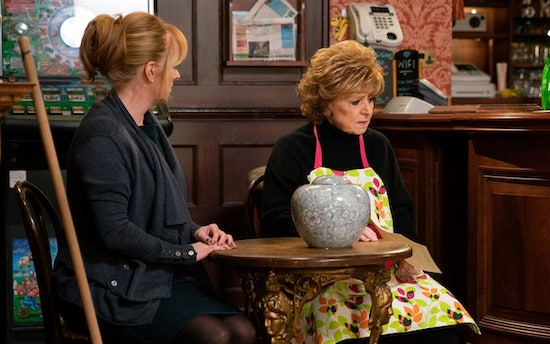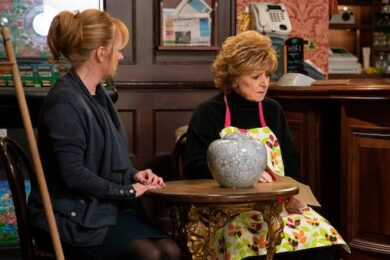As is customary when you sit a group of people in their twenties from the North West together, a conversation about Coronation Street will spark up. It happened to me recently. I sat back, quietly seething, for I had absolutely nothing to offer. This conversation was once my time to shine, but now I found myself joining the boring ranks of those who’d lost their nerve and turned their back on the soap, which celebrated its 10 000th episode this month.
Family relationships and perhaps two friendships aside, my interest in Coronation Street was the only throughline that ran from my childhood to my early 20s. As a child, I would check Coronation Street fan sites and once social media arrived, I quickly learned that ITV published their picture previews of forthcoming episodes in the small hours between Sunday night and Monday morning. I’d be there, refreshing my news feed. This was a habit formed before on-demand streaming, so mealtimes were built around viewing schedules.
We rarely surprise ourselves, but abruptly giving up Coronation Street in early 2018 was one such moment. It was always going to happen, but this was in the same knotty way that I’m also going to give up smoking for vaping (still fairly likely) and definitely read all of Proust (slightly less likely). The novelist Edward St Aubyn didn’t give up Coronation Street, he gave up heroin, and when he did so he retreated to the countryside and read Proust’s In Search of Lost Time – all seven volumes and 3000 pages. Slowly. Where Proust’s project tracked the life of its central character Charles Swann through the minutiae of their life, soaps do something similar. Impressions are formed by the accumulated weight of details that snowball over years of viewing. How could one make sense of the sheer strangeness of Gail Platt – an erratic presence who mistakes Solange for an ice lolly – without having been marinated in her presence over decades?
Having kept up my abstinence with only a few minor relapses, the landmark 10 000th episode – broadcast on Friday 7th February – is designed for people like me. Like a lapsed Catholic returning to mass at Christmas, it’s understood that many viewers will dip out as promiscuously as they dipped in. In the episode, Rita Sullivan (played by Barbara Knox since 1964) has been tasked with scattering the ashes of her estranged late husband Dennis Tanner, “Manchester’s answer to Brian Epstein”. This means an impromptu trip to Blackpool. So far, so realistic – last summer I took an impromptu trip to Blackpool, I got drunk on Prosecco and tried to blag Armed Forces Discount at the Pleasure Beach. Prosecco arrives early in this episode, greeted with the reverent ecstasy of the main guest at a surprise party once it’s pulled out – the bottle large in the shot, the cast’s delighted faces soft focus in the background. In a gesture of communal solidarity, various Coronation Street stalwarts have ensured that Rita is supported on her journey to Blackpool, and have hired a party bus. We know it’s a party bus, because it says ‘PARTY BUS’ in large letters on the side, and – more importantly – is playing Vengaboys on arrival. Soundtrack is important – soaps don’t generally contain music, but here the bus speaker system provides excuse for high energy, gaudy hits that underline the Street’s commitment to its matriarchs. ‘Rock The Boat’. ‘I’m Every Woman’. ‘All The Single Ladies’. The interior décor of the bus resembles, one character suggests, “the inside of Liberace’s dishwasher.”
With neoliberalism eroding our communal spaces, the coach trip to Blackpool makes me wonder if soaps are now the only arena where we see teenagers side by side with pensioners? Be it the local pub, the industrialised workplace or the church, the institutions that once fostered intergenerational commune have declined in our society.
Many young people – myself included – left their towns for economic reasons and moved to cities, meaning young people are living increasingly surrounded by other young people, and old people the same. It’s thought that this demographic shift might in part be responsible for Conservative victories in Northern seats in the 2019 General Election. Soaps as a phenomena are in decline too – 27 million viewers watched one episode of Coronation Street in 1987, but figures now hover limply around the six million mark. But why do young people continue to watch the soap, as they do? Is it communing with a folk memory leftover from grandparents? Nostalgia for the areas that they perhaps have left behind?
The 10 000th episode seems anxious to address this tension. The culture wars, it seems, have hit the cobbles. There’s a terse altercation between an elderly character and a teenage goth. “My generation lived through a war” sniffs Lipman. When was she born? A pause. “1946.” The generation who most narrowly avoided the horrors of war being the most intoxicated by reliving it is a familiar fixture of modern British life – you might call it Mark Francois Syndrome. “Suck that my little snowflake” says Lipman after pointing out that the goth’s generation will have a lower life expectancy.
It wasn’t always this way. Coronation Street is perhaps our only surviving monument to the working-class drama boom of the 1960s, Tony Warren’s original programme emerged from the same cultural moment that produced A Taste of Honey and Saturday Night and Sunday Morning. “We were stunning in them days” says Rita in Corrie anniversary episode, evoking Aunt Ada in Saturday Night and Sunday Morning who said, “them was rotten days.” Stunning then, something else entirely now. The Street likes to genuflect to this past, but it has little bearing on the actuality of the soap’s current output. You can tell this in the way that the soap has lost its nerve on issues of class and taste.
One character apparently does not know about herbs (fucking herbs!) – this speaks to a similar cultural cringe that led to Andy Burnham, when asked in the 2015 Labour leadership contest about his favourite biscuit, answering “beer, chips and gravy.” What wouldn’t Andy Burnham do for a cameo in the Rover’s Return?
An accidental by-product of its own longevity is that Coronation Street now has to answer the question of what long-running television programmers do with their own history. How do they grapple with a past that’s a foreign country to its own audience? Rita and Ken stand as the last standing emissars from that past; the party grandees. “You’re the last one left, round here” observes Rita to Ken in hushed, Mafioso tones. Like any old firm, they’re hunkering down, closing ranks, overlooking indiscretions to maintain the brand. Audrey scratches a painful memory for Rita, who quietly forgives her. “We’re not going to fall out” eyes fixed, gesturing to the trio, “there’s not many of the old guard left.”
It’s Ken’s turn next to grope the regrets that have haunted him throughout his sixty years on Coronation Street – played by the 87-year-old Bill Roache, the longest serving television actor on the planet. We’re listening to the lost opportunities of Ken Barlow, but what we’re watching are the lost opportunities of Roache. Like his character, Roache is trapped by the Street. Barlow went to university – and don’t we all know it – but all he got was alienation from his family, and a stiffness that similarly made Roache hard for the public to love. He got stuck in his first big acting job, the commission that was meant to last twelve episodes but ended up engulfing a lifetime. How must it have felt to watch co-stars – Anne Reid, Sarah Lancashire, Suranne Jones – serve time on the soap only to use it as a springboard for bigger things? Similarly like his character, Roache’s personal life has seen off multiple marriages, affairs, court cases and personal tragedies. This turmoil is perhaps why, in 1999, Roache was bankrupted by a libel action against the Sun for having dubbed him ‘boring Ken Barlow’. Roache was incensed – he was never being boring. So incensed was Bill that he produced a board game about British libel law – “Libel”. Ages: three years and up. ASI number B01MRS02J3. Produced by ‘MAMBI’ (Me And My Big Ideas). In 2010, the cultural historian Joe Moran suggested that Barlow was the inverse of George Bailey, the protagonist of the film It’s a Wonderful Life. Where Bailey was ‘rewarded for staying in his hometown of Bedford Falls’ through ‘how rich and fulfilled his life of thwarted ambition has actually been’, Barlow stagnated through an ‘imperfect marriage and dull home’. Unusually, the episode directly addresses Moran’s proposition. Barlow compares himself to Bailey, adding that Bailey ”was a better man than I am.” Rita rejects this hypothesis – cataloguing the lives he’s enriched, the loves he’s shared. Is Ken convinced? A moment towards the episode’s end suggests otherwise.
But what of the urn? For absolutely no discernible reason, Rita places the urn in the middle of a car park, stood a few metres away staring at it. She’s still staring when a vehicle very slowly runs the urn over – porcelain shattering, the remnants of Manchester’s Brian Epstein ground over by thick rubber tyre. No matter, we’ve had our day out, and the episode closes with a hallucinatory sequence of Rita wandering the Rovers’ Return pub, empty at night, the voices of punters past and present ringing aloud for a little too long as she slowly takes her seat in a booth. “All of them hotpots” she reflects, “all of them gone now.” In search of lost time.
Next Monday night, there’s a good chance I’ll have my evening meal around 8pm, but I probably won’t be watching Coronation Street. Though, in all likelihood, I won’t be reading Proust neither.



